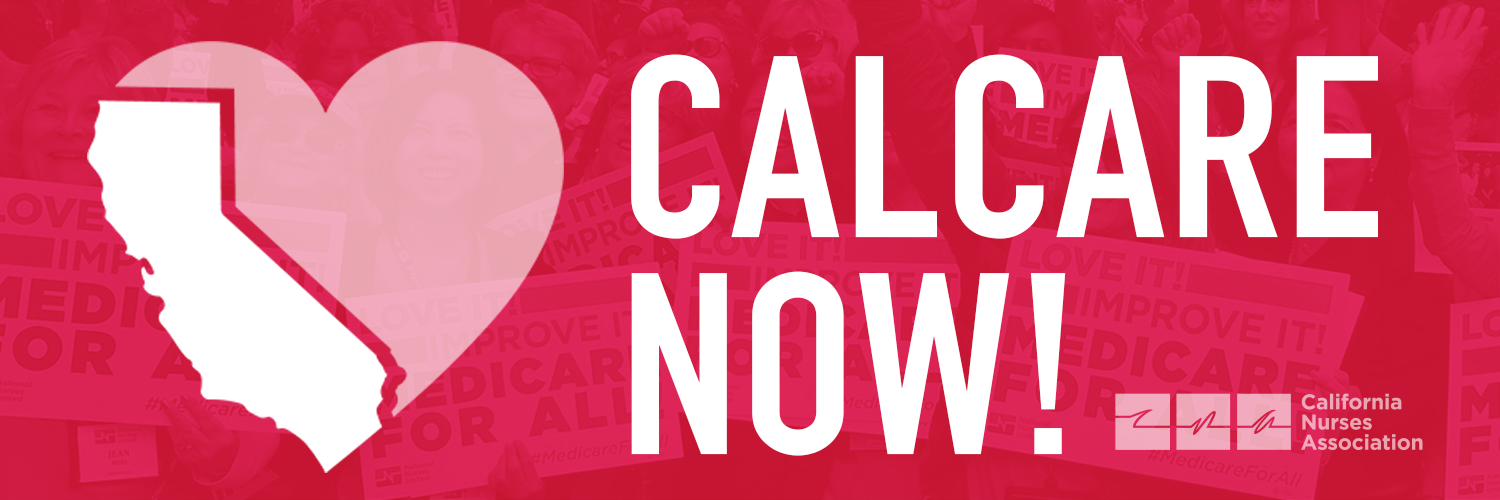

CalCare is the name of the California Single-Payer/Medicare for All Health Care System proposed by the California Nurses Association.
CalCare AB 2200 would guarantee comprehensive, high-quality health care for all Californians as a human right and lead the nation in the larger fight for health care justice.
ACCEPT NO SUBSTITUTES
SINGLE-PAYER OR BUST!

JOIN THE HEALTH CARE REVOLUTION!
Single Payer Health Care is the solution to our fragmented, expensive, inefficient, and deadly for-profit, health insurance system. Multiple studies have been conducted and shown the overwhelming benefits of a Single Payer system, many which you can find here. Beyond cost savings in the millions for hospitals, businesses and individuals, delivery of care is more efficient and there are better outcomes all around. When providers are able to pay attention to their patients instead of being bogged down with insurance billing, everyone benefits. Unified Financing is an insurance loophole. It is NOT Single Payer. Accept no substitutes.
No Insurance Loopholes
Saves Money
Saves Lives
CALCARE
IS THE
SINGLE-PAYER POLICY BILL
Join the movement and take action for AB 2200 CalCare: The California Guaranteed Health Care for All Act
Common questions
CALCARE ANSWER BACKS
How is CalCare Affordable?
Simply-put, single-payer systems save money, and CalCare is no exception.
Under CalCare, California would spend less money on health care every year than we do under our current system while providing more, comprehensive care to all Californians. Multiple recent studies and a metastudy show that a single-payer health care system would result in lower overall health care costs than our current system. In its April 2022 final report, the Healthy California for All Commission found that under a single-payer model with no cost sharing and long-term care for all, California would save between $32 billion to $213 billion over 10 years compared to our current system. Similarly, an analysis from the Political Economy Research Institute (PERI) in 2017 found that a statewide single-payer health care system in California would reduce net overall costs by 8 percent relative to the existing system.
Will my delivery of care change?
No, CalCare is a simplified payment system that will not disrupt the delivery or quality of health care that Californians have grown accustomed to. On the contrary, CalCare will end persistent disruptions to care that arise from changes in health insurance and provider networks. For example, a visit to the doctor would be adequately reimbursed by CalCare without the need for a prior approval or authorization from an insurer or health plan. Under CalCare, the only thing that would change is how your health care is paid.
what if I travel out of state?
If you are a California resident traveling out of state, it would be no different than what you experience now; your CalCare coverage follows you. Whatever you facility you visit would simple bit the CalCare Trust Fund.
How will you pay for CalCare?
Financing a single-payer system, like CalCare, comes down to combining existing public health care dollars with progressively structured state revenue sources into a single, public program that replaces the enormous premiums, deductibles, copays, and surprise bills that individuals and employers are now paying to insurers and providers. In California, spending by the federal government on public health care programs (Medicare, Medi-Cal, and the Affordable Care Act) already represents close to 40 percent of all direct health care spending in the state while state and local spending represent about another 9 percent. For the remainder of financing, CalCare would replace our current system of insurance premiums, copays, and other cost-sharing – which disproportionately hurts working families – with a progressive financing system in which the vast majority of households would have a net savings.
Will my taxes go up?
Currently, nearly 50% of health care dollars are tax dollars. The remaining will be less than what people currently pay in premiums, deductibles, copays, coinsurance out of pocket expenses. Why? because Single Payer CalCare removes the bloat and inefficiency of a for-profit system. So yes, your ‘taxes’ will go up, but you will pay less over all and receive better coverage & care.
Doesn't calCare need to have financing language?
No, it does not. It is common for opponents of a major policy proposal to attack the proposal based on it being “too expensive” or “not paid for,” but that standard is only selectively applied when there is a big proposal on the table. Financing is just another part of the legislative process, and it is the job of the legislature to decide if a policy is worth implementing and how that policy should be funded.
The California Nurses Association (CNA) is asking that the legislature treat CalCare like any other policy that will eventually need a funding component – that the legislature start the process of considering a policy bill (i.e., holding hearings and debating the legislation) and start the process of debating and developing a financing plan on a parallel track just as they do with every other bill. It’s a fallacy for any legislator or CalCare opponent to argue that funding for a big dollar program/policy must be discussed, agreed upon, and passed first before the legislature ever formally starts considering or has a hearing about a new program.
THE 7 PRINCIPLES OF CALCARE
UNIVERSAL COVERAGE:
Everybody in, nobody out. Everybody, regardless of race, sex, gender, country of origin, disability status, immigration status, marital status, age, and income, gets the care they need regardless of ability to pay.
A SINGLE PUBLIC PROGRAM:
A single payer, publicly funded through progressive taxation, to cover all necessary care in California, eliminating billions in bloat and waste and saving people thousands on their health care costs.
FULLY COMPREHENSIVE BENEFITS:
Includes medical, dental, hearing, vision, mental health, prescription drugs, long term care, and more. All decisions about care would be made between you and your doctors and nurses, not insurance companies.
FREEDOM TO CHOOSE YOUR CARE PROVIDER:
Under CalCare, there would be no more “in network” or “out of network.” You would have the freedom to choose any doctor or hospital you’d like.
FREE AT THE POINT OF SERVICE:
No more copays, premiums, or deductibles. You arrive at the doctor’s office, show them your CalCare card, and get the care you need. It’s that simple!
JUST TRANSITION:
Funding and programs to protect and support any displaced workers in the insurance industry.
PATIENT CARE BASED ON PATIENT NEED:
No more financial incentives to avoid providing necessary care, including “value-based” payment models for providers.
CALCARE VIDEO PLAYLIST
1:53:21
1:57:55
2:37:18
WANT MORE INFO?
